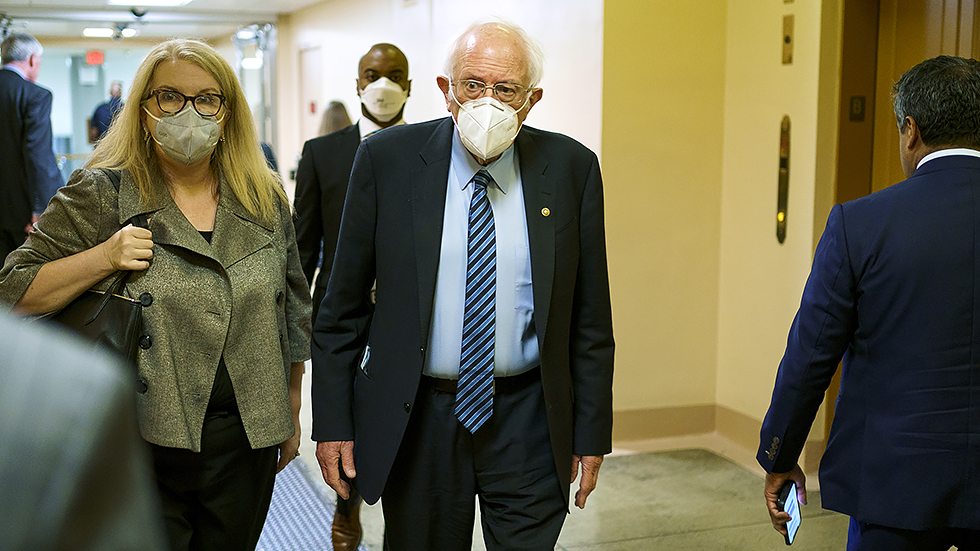Tensions simmered on the Senate floor early Sunday as members clashed during an overnight voting marathon over a proposal offered by Sen. Bernie Sanders (I-Vt.) to restore the party’s expanded child tax credit.
Sanders offered an amendment to revive the expanded credit, which lapsed late last year, as part of Democrats’ sprawling tax, health care and climate bill, dubbed the Inflation Reduction Act. But the Vermont Independent was the only one to support the revision, as it ultimately failed in a 1-97 vote.
The vote came as the Senate hunkered down for an hours-long vote-a-rama, one of the last, key hurdles Democrats have to clear to secure passage for their mammoth bill. During the often grueling, drawn-out voting session, any senator has the chance to force a floor vote on amendment.
In floor remarks ahead of the vote on Sunday, Sanders said the amendment sought to bring back a temporary expansion to the credit that was passed in the American Rescue Plan, a sweeping coronavirus relief package Democrats passed last year.
“Pathetically, the United States has the highest child poverty rate of almost any major country on Earth, and it is especially high among young people of color,” Sanders said. “This is the wealthiest nation on Earth, we should not have the highest rate of childhood poverty of almost any country.”
“The American Rescue Plan included a $300 a month child tax credit which ended up lowering the child poverty rate in America by over 40 percent,” Sanders added, noting his amendment would restore the expanded credit for four years and “be fully paid for by restoring the top corporate tax rate from 21 percent to 28 percent.”
The move by Sanders drew immediate pushback from Democrats ahead of the amendment vote, who expressed support for the child tax credit provision by itself but emphasized that they could not support the change in an effort to protect final passage on the full package.
“Sen. Sanders is right, the child tax credit is one of the most important things this body did. It brought down the child poverty rate by 40 percent almost immediately,” said Sen. Sherrod Brown (D-Ohio), who has long advocated for a renewal of the expanded credit. But he urged colleagues against voting for the amendment to avoid bringing “the bill down.”
Sen. Michael Bennet (D-Colo.) sounded a similar note, vowing to work with his colleagues on advancing the provision but arguing that it should not be moved in the climate, taxes and health care bill.
“We have to fight to make this enhanced child tax credit permanent and that’s what I will do with people on both sides of the aisle. But this does not advance that cause because we could lose the underlying bill and therefore, we should vote against the amendment,” the Colorado Democrat said.
But Sanders appeared unsatisfied with his colleagues’ positions. He shot back at Brown, asking why passing the amendment or allowing 48 Democrats to vote for it would tank the bill.
The Ohio Democrat pointed to the tenuous nature of passing legislation through budget reconciliation in an evenly split Senate, which is requiring all Democrats to sign on to the bill for it to clear the chamber. If the amendment were added to the bill, it could put a final passage in jeopardy by dissuading a member from supporting the overall legislation.
Ahead of the weekend’s marathon debate, a number of Democrats vowed to vote against any amendments brought to the floor — even if they agree with the premise of the change — to preserve its chances of the bill passing.
“The arrangement in this is, all 50 Democrats support this. We know every single Republican has voted against the child tax credit not once last March but twice, but we know that this is a fragile arrangement and we’ve got to pass it, as much as I’d like to do it, as would Sen. Bennet,” Brown said.
At the end of his remarks, the senator could be heard saying, “Come on, Bernie.”
The amendment was one of several ambitious proposals Sanders brought up early Sunday, all of which were overwhelmingly defeated. He brought them up hours after criticizing Democrats’ Inflation Reduction Act for not going far enough on key issues like health care, child care and housing.
Sanders also offered measures aimed at ensuring Medicare pays no more for prescription drugs than the Department of Veterans Affairs (VA), and expanding Medicare coverage to include dental, oral, hearing and vision benefits as potential changes to the package.
The VA-related revision failed in a vote of 1-99, with Sanders being the sole member who voted in favor. The Medicare expansion change Sanders offered failed 3-97, after Sens. Raphael Warnock (D-Ga.), who is facing a tough reelection campaign in November, and Jon Ossoff (D-Ga.) joined the Vermont progressive in voting for it .
Sanders also introduced an amendment to establish a Civilian Climate Corps, though the amendment failed in a 1-98 vote.
The amendments from Sanders came as no surprise, as the senator has repeatedly voiced frustration with the Inflation Reduction Act, which is drastically scaled down from the Democrats’ earlier Build Back Better Act that the Vermont senator pushed hard to pass last year.
Senate Majority Leader Charles Schumer (DN.Y.) announced a deal with Sen. Joe Manchin (DW.Va.) on the smaller bill in late July, months after talks around the larger plan fell apart due to opposition from the West Virginia centrist.
In remarks ahead of the vote-a-rama on Saturday, Sanders aired a list of complaints with the slimmed-down bill, which he said “does not address the reality that we have more income and wealth inequality today than at any time in the last hundred years.”
“This bill does nothing to address the systemic dysfunctionality of the American health care system,” he also said, while also criticizing the bill for not doing more to address the nation’s child poverty rates or the “major housing crisis.”
